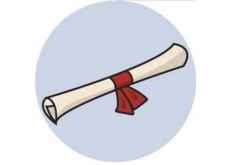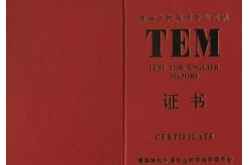一、2000年考研英语阅读真题解析及答案
Passage 5
If ambition is to be well regarded, the rewards of ambition-wealth, distinction, control over one's destiny-must be deemed worthy of the sacrifices made on ambition's behalf. If the tradition of ambition is to have vitality, it must be widely shared; and it especially must be highly regarded by people who are themselves admired, the educated not least among them. In an odd way ,however ,it is the educated who have claimed to have given up on ambition as an ideal. What is odd is that they have perhaps most benefited from ambition-if not always their own then that of their parents and grandparents. There is a heavy note of hypocrisy in this, a case of closing the barn door after the horses have escaped-with the educated themselves riding on them.
Certainly people do not seem less interested in success and its signs now than formerly. Summer homes, European travel ,BMWs-the locations, place names and name brands may change, but such items do not seem less in demand today than a decade or two years ago. What has happened is that people cannot confess fully to their dreams ,as easily and openly as once they could ,lest they be thought pushing ,acquisitive and vulgar .Instead ,we are treated to fine hypocritical spectacles ,which now more than ever seem in ample supply the critic of American materialism with a Southampton summer home ;the publisher of radical books who takes his meals in three star restaurants; the journalist advocating participatory democracy in all phases of life, whose own children are enrolled in private schools. For such people and many more perhaps not so exceptional, the proper formulation is,"Succeed at all costs but avoid appearing ambitious."
The attacks on ambition are many and come from various angles; its public defenders are few and unimpressive,swheresthey are not extremely unattractive. As a result, the support for ambition as a healthy impulse, a quality to be admired and fixed in the mind of the young, is probably lower than it has ever been in the United States. This does not mean that ambition is at an end, that people no longer feel its stirrings and promptings, but only that, no longer openly honored, it is less openly professed. Consequences follow from this, of course, some of which are that ambition is driven underground, or made sly .Such ,then, is the way things stand: on the left angry critics, on the right stupid supporters, and in the middle, as usual, the majority of earnest people trying to get on in life.
17.It is generally believed that ambition may be well regarded if .
[A]its returns well compensate for the sacrifices
[B]it is rewarded with money, fame and power
[C]its goals are spiritual rather than material
[D]it is shared by the rich and the famous
18.The last sentence of the first paragraph most probably implies that it is .
[A]customary of the educated to discard ambition in words
[B]too late to check ambition once it has been let out
[C]dishonest to deny ambition after the fulfillment of the goal
[D]impractical for the educated to enjoy benefits from ambition
19.Some people do not openly admit they have ambition because .
[A]they think of it as immoral
[B]their pursuits are not fame or wealth
[C]ambition is not closely related to material benefits
[D]they do not want to appear greedy and contemptible
20.From the last paragraph the conclusion can be drawn that ambition should be maintained .
[A]secretly and vigorously
[B]openly and enthusiastically
[C]easily and momentarily
[D]verbally and spiritually

第一部分 文章背景
[内容分类]人文--道德伦理
本文是历年考研题目中较难的一篇,全篇围绕ambition展开,批判了一些受过良好教育者对ambition所抱的虚伪态度,同时也暗示了对ambition的追求是一种健康的行为。
第二部分 语言点详解
1. well regarded十分看重
[大纲词汇] regard v.(as)把···看作为,把···认为;考虑,注视
[扩充含义] regard v.敬爱,尊敬,看重
[经典例句] She is highly regarded in her profession.
2. reward回报
[大纲词汇] reward n.(for)报酬,赏金,奖赏v.(for)酬劳,奖赏;酬谢,报答,奖酬
[经典例句] The rewards of art are not to be measured in money.
3. destiny命运
[大纲词汇] destiny n.命运;天数,天命
[经典例句] We must put our destiny in our own hands.
4. deem认为
[大纲词汇] deem v.认为,深信
[经典例句] He deemed it his duty to take care of the children of his dead brother.
5. on sb's behalf为了··· [大纲词汇] on sb's behalf ( = on behalf of sb. )代表,为了
[经典例句] His wife attended the meeting on his behalf.
6. vitality生命力
[大纲词汇] vital a.生死攸关的,重大的;生命的,生机的
[衍生词汇] vitality n.生命力;生机;活力;生存力,持久力
[经典例句] He is a young man of great vitality.
7. in an odd way以一种奇怪的方式
[大纲词汇] odd a.奇数,单的;奇怪的,古怪的;单只的,不成对的;临时的,不固定的;带零头的,余的
[经典例句] He handle the situation in an odd way.
8. hypocrisy虚伪
[扩充词汇] hypocrisy n.伪善,虚伪
hypocrite n.伪君子
hypocritical a.虚伪的
[经典例句] His hypocrisy angered all the people present.
9. formerly以前地
[大纲词汇] former a.以前的,在前的
[经典例句] He was formerly a elementary school teacher.
10. in demand所需要的
[扩充词组] in demand所需要的
[经典例句] Oil is in great demand these days.
11. confess to承认
[大纲词汇] confess v.供认,承认,坦白,忏悔
[经典例句] He confessed to the crime he had committed.
12. lest免得
[大纲词汇] lest conj.惟恐,免得
[经典例句] She didn't tell them the truth, lest they would get involve.
13. pushing急功近利的
[大纲词汇] push v.推;催逼,逼迫n.推,推力;促进,推进
[衍生词汇] pushing a.推的;有进取心的;一意孤行的
[经典例句] She is a very nice person except that she is a bit pushing.
14. acquisitive贪婪的
[大纲词汇] acquire v.取得,获得;学到
[衍生词汇] acquisitive a.渴望获得的,迫切求取的,贪婪的
[经典例句] Finally his acquisitive instinct got the upper hand.
15. vulgar粗俗的
[扩充词汇] vulgar a.庸俗的,粗俗的;粗鲁的,粗野的
[经典例句] He is a person of vulgar taste.
16. treat to款待
[大纲词汇] treat v.对待;处理;治疗;论述,探讨;款待,请客n.款待,请客
[经典例句] I will treat you all to a little piano specialty of my own.
17. spectacle景象
[大纲词汇] spectacle n.[pl.]眼镜;场面,景象;奇观,壮观
spectacular a.壮观的,引人注目的
[经典例句] The burning house is a terrible spectacle.
18. ample充分的
[大纲词汇] ample a.充分的,富裕的;宽敞的,宽大的
[经典例句] The city's many cultural and sports facilities offer ample recreation.
19. materialism唯物主义
[大纲词汇] materialism n.唯物主义
material a.材料,原料,资料a.物质的,实体的
20. participatory参与的
[大纲词汇] participate v.(in)参与,参加;分享,分担
participant n.参加者,参与者
[衍生词汇] participatory a.参与的,参加的,积极参与的
[经典例句] Participatory art is quite popular with some artists nowadays.
21. phase阶段
[大纲词汇] phase n.阶段,状态,时期;相,相位
[经典例句] The book covers all phases of Picasso's work.
22. enroll入学
[大纲词汇] enroll/enrol v.招收;登记;入学
[经典例句] The union enrolls over 100 000 worker in New York.
23. exceptional例外的
[大纲词汇] exceptional a.例外的,异常的
[经典例句] He treated his employees with exceptional cruelty.
24. formulation构想
[大纲词汇] formulate v.构想,规划;系统得阐述
[衍生词汇] formulation n.系统的阐述;规划,构想
[经典例句] He stated his opinion on the formulation of policies.
25. at all costs不惜任何代价
[大纲词汇] at all costs不惜任何代价,无论如何
[经典例句] He vowed to succeed at all costs.
26. angle角度
[大纲词汇] angle n.角;角度;方面,观点
[词汇比较] angel a.天使**两词拼写相近,易混淆,注意区分
[经典例句] It will give you a more objective picture if you consider the issue from various angles.
27. probably很可能地
[大纲词汇] probable a.很可能的,大概的;有希望的,可能的
[经典例句] She is probably the best singer in this country.
28. at an end完结
[扩充词组] at an end完结,耗尽
[经典例句] Everything between the lovers were at an end.
29. stirring冲动,激励
[大纲词汇] stir v.搅拌,搅动;动,摇动;激动;轰动;煽动,鼓动
[衍生词汇] stirring a.激动人心的;忙碌的,活跃的n.激励,鼓舞
[经典例句] He tried to suppress the stirrings of visiting her.
30. prompting鼓舞
[大纲词汇] prompt v.激起,促进,推动
[衍生词汇] prompting n.推动,促进,鼓舞,激励
[经典例句] The book would never have been written without the promptings of my wife.
31. profess承认
[扩充词汇] profess v.承认,表示;声称
professed a.公开表示的;公开声称的
[经典例句] He professed himself a lover of music.
32. earnest热切的
[大纲词汇] earnest a.热心的,诚挚的
[经典例句] He is an earnest student.
33. get on in life出人头地
[大纲词汇] get on发迹,出人头地
[经典例句] The young man is sure to get on in the world.
34. customary习惯的
[大纲词汇] customary a.习惯的,惯例的
[经典例句] He made his customary visit to his parents every week.
35. discard抛弃
[大纲词汇] discard v.抛弃,丢弃
[经典例句] His friends urge him to discard his bad habits.
36. check控制
[大纲词汇] check v.检查,核对;制止,控制;(凭票)托运或寄存
[经典例句] He tried his best to check his anger.
37. momentarily瞬间地
[大纲词汇] momentary a.瞬间的,片刻的
[经典例句] He paused momentarily to have some water and proceeded.
第三部分 难句解析
1. If ambition is to be well regarded, the rewards of ambition---wealth, distinction, control over one's destiny---must be deemed worthy of the sacrifices made on ambition's behalf.
[结构剖析]:此句包含一个if引导的条件状语从句If ambition is to be well regarded,主句的主语是the rewards of ambition,谓语是must be deemed,而wealth, distinction, control over one's destiny既是插入语,又是the rewards的同位语。made on ambition's behalf是the sacrifices的补语。
[阅读重点]:本句中须弄清一些词汇的含义,如distinction声望显赫或出人头地、worthy of对得起或不辜负、on behalf of为了,等等。
[参考译文]:如果个人的野心被人看得很重,那么野心带来的好处--荣华富贵、出人头地、命运自主--都应被认为是值得为了这雄心壮志而做出的各种牺牲。
2. If the tradition of ambition is to have vitality, it must be widely shared; and it especially must be highly regarded by people who are themselves admired, the educated not least among them.
[结构剖析]:这是一个并列关系的复句。前一个分句又包含由if引导的条件状语,主句中的主语it指代the tradition of ambition。后一分句中who are themselves admired修饰people,the educated not least among them是people的补语。
[阅读重点]:注意people who are themselves admired指自己也受人仰慕的人士,not least义为相当重要。
[参考译文]:如果野心的传统具有生命力,那么这传统必会为许多人分享;尤其会受到自己也受人仰慕的人士的青睐,在这些人中受过良好教育的可不占少数。
3. There is a heavy note of hypocrisy in this, a case of closing the barn door after the horses have escaped---with the educated themselves riding on them.
[结构剖析]:a case of closing the barn door after the horses have escaped是前面主句的补语,with the educated themselves riding on them是补语中的伴随状语。
[阅读重点]:hypocrisy虚伪或伪善,理解了这个词,后面的比喻就简单了。要理解这个比喻,最好把句中的马理解为ambition的象征。注意这个比喻和"亡羊补牢"没有任何关系,它的意思更接近于"掩耳盗铃";在这里是指受过良好教育的人在自己的野心实现以后,从追求野心的过程中受了益,但他们得了便宜还卖乖,反过来谴责野心,并说自己并没有追求野心。
[参考译文]:这种事情带有很浓重的虚伪性,就好比等马儿全逃光了,才把马厩的门关死------而骑在那些马上的正是那群受过良好教育的人。
4. Certainly people do not seem less interested in success and its signs now than formerly. Summer homes, European travel, BMW---the locations, place names and name brands may change, but such items do not seem less in demand today than a decade or two years ago.
[结构剖析]:此处出现了两个比较级,less interested in success and its signs now than formerly和less in demand today than a decade or two years ago。
[阅读重点]:千万注意两句中的双重否定:"do not seem less interested in success and its signs now than formerly"means"seem at least as interested in success and its signs now as formerly,if not more",后面的do not seem less in demand today than a decade or two years ago也是如此。
[参考译文]:当然,人们现在对成功及其各种标志的兴趣似乎并不亚于先前。消夏别墅、欧陆旅行、宝马车--地点、地名以及品牌或许会有变化,但这类事物在今天被人渴求的程度也似乎不会亚于一二十年前。
5. What has happened is that people cannot confess fully to their dreams, as easily and openly as once they could, lest they be thought pushing, acquisitive and vulgar.
[结构剖析]:what一词指代的是that引导的从句,从句中as easily and openly as once they could又是下一层的状语,此外lest引导带虚拟语气的假设状语从句。
[阅读重点]:注意lest一词的含义(唯恐)和用法(引导虚拟语气)。而且在阅读过程中应该能够推测出pushing, acquisitive,vulgar三词都是贬义
[参考译文]:现在发生的事情是人们总不能象从前一样轻松坦白地承认他们有这样的梦想,唯恐自己被人理解为急功近利、贪婪或庸俗。
6. Instead, we are treated to fine hypocritical spectacles, which now more than ever seem in ample supply: the critic of American materialism with a Southampton summer home; the publisher of radical books who takes his meals in three-star restaurants; the journalist advocating participatory democracy in all phases of life, whose own children are enrolled in private schools.
[结构剖析]:本句的主句是we are treated to fine hypocritical spectacles。后面有一个非限定性的定语从句,修饰spectacles。在冒号的后面是三个并列的名词性短语,其核心词分别是critic, publisher,和journalist.
[阅读重点]:要理解本句,首先要正确理解be treated to的意思是"被款待,被招待";因此后面的spectacles就不是"眼镜",而是"壮观景象",此处有一定的反讽意味。后面即使不理解其具体含义,大致也应该抓住的是虚伪,说一套做一套的具体事例,从这个角度理解就比较清楚了。
[参考译文]:相反,我们被款待看到这样一些虚伪的壮观景象,他们似乎比以前的任何时候都更供应充足:美国式物质主义的批判者却拥有位于南安普顿的避暑山庄;激进书籍的出版商却在三星级餐厅享用一日三餐;倡导在人生各个阶段的参与民主制的记者,他的子女却就读于私立学校。
7. The attacks on ambition are many and come from various angles; its public defenders are few and unimpressive,swheresthey are not extremely unattractive.
[结构剖析]:此句是用分号隔开的两个并列句,后面的一个分句中有一个where引导的定语从句,从整体上来修饰its public defenders,只不过先行词用了where。
[阅读重点]:要理解分号前后是从正反两个方面来说明人们对于ambition的态度,同时注意最后的定语从句中的那个双重否定,表达了作者的一种态度,说明作者对于野心的维护者是抱肯定的态度的,从而也能推出作者对于野心也是持积极态度的,而作者所不齿的是对于野心问题虚伪的、说一套做一套的做法。
[参考译文]:对野心的抨击层出不穷,且来自各个角度;公开为野心辩护者寥寥无几、毫无力度,但他们不能说是完全不吸引人的。
第四部分
参考答案:17.A 18.C 19.D 20.B
二、2001年考研英语阅读真题解析及答案
Passage 3
Why do so many Americans distrust what they read in their newspapers? The American Society of Newspaper Editors is trying to answer this painful question. The organization is deepsintosa long self-analysis known as the journalism credibility project.
ools to cope with work that is dangerous, boring, burdensome, or just plain nasty. That compulsion has resulted in robotics瞭he science of conferring various human capabilities on machines. And if scientists have yet to create the mechanical version of science fiction, they have begun to come close.
As a result, the modern world is increasingly populated by intelligent gizmos whose presence we barely notice but whose universal existence has removed much human labor. Our factories hum to the rhythm of robot assembly arms. Our banking isdone at automated teller terminals that thank us with mechanical politeness forthe transaction. Our subway trains are controlled by tireless robo瞕rivers. Andthanks to the continual miniaturization of electronics and micro瞞echanics, there are already robot systems that can perform some kinds of brain and bone surgery with submillimeter accuracy—far greater precision than highly skilled physicians can achieve with their hands alone.
But if robots are to reach the next stage of laborsaving utility, they will haveto operate with less human supervision and be able to make at least a few decisions for themselves—goals that pose a real challenge.“While we know how to tell a robot to handle a specific error,”says Dave Lavery, manager of a robotics program at NASA,“we can't yet give a robot enough‘commonsense’to reliably interact with a dynamic world.”
Indeed the quest for true artificial intelligence has produced very mixed results. Despite a spell of initial optimism in the 1960s and 1970s when it appeared that transistor circuits and microprocessors might be able to copy the action of the human brain by the year 2010, researchers lately have begun to extend that forecast by decades if not centuries.
What they found, in attempting to model thought, is that the human brain's roughly one hundred billion nerve cells are much more talented—and human perception far more complicated—than previously imagined. They have built robots that can recognize the error of a machine panel by a fraction of a millimeter in a controlled factory environment. But the human mind can glimpse a rapidly changing scene and immediately disregard the 98 percent that is irrelevant, instantaneously focusing on the monkey at the side of a winding forest road or the single suspicious face in a big crowd. The most advanced computer systems on Earth can't approach that kind of ability, and neuroscientists still don't know quite how we do it.
46.Human ingenuity was initially demonstrated in.
A眛he use of machines to produce science fiction
B眛he wide use of machines in manufacturing industry
C眛he invention of tools for difficult and dangerous work
D眛he elite's cunning tackling of dangerous and boring work
47.The word“gizmos”(line 1, paragraph 2)most probably means.
A眕rograms
B眅xperts
C眃evices
D眂reatures
48.According to the text, what is beyond man's ability now is to design a robot that can.
A眆ulfill delicate tasks like performing brain surgery
B眎nteract with human beings verbally
C県ave a little commonsense
D眗espond independently to a changing world
49.Besides reducing human labor, robots can also.
A眒ake a few decisions for themselves
B眃eal with some errors with human intervention
C眎mprove factory environments
D眂ultivate human creativity
50.The author uses the example of a monkey to argue that robots are.
A眅xpected to copy human brain in internal structure
B盿ble to perceive abnormalities immediately
C眆ar less able than human brain in focusing on relevant information
D眀est used in a controlled environment
46盋题意是:人类的创造力最初展示在。
A笔褂没器产生科学幻想;B痹谥圃煲倒惴菏褂没器;C狈⒚鞴ぞ咭杂Ω都柘盏墓ぷ;D本英人才机智地应付危险和枯燥的工作。
本题考生只要正确理解文首第一句话的含义即可,文中并没有强调“the elite(精英人才)”,只提到“people have devised cunning tools”,
因此排除D,而A、B两项都不符合题中“initially(最初、最早)”这一要求,故而选C。
47盋本题要判断“gizmos”这一单词的含义,由第一段提到“robotics”,而“conferring human capabilities on machines”与修饰gizmos的定语从句中“remove, much human labor”相照应,联系上下文句意,gizmos应该是与机器人有关,因此排除A、B、D,选C。这也从gizmos的下面四句举例论述可以看出,如工厂中的机械,银行的自动出纳终端,地铁的无线机器驾驶员等。
48盌题意为:人类现在还无法设计一个能的机器人。
A鼻康“fulfill delicate tasks”,第二段最后一句指出,已经有机器人系统,能完成某些大脑或骨科外科手术,因此排除A;B鼻康饔肴私行言语上的交流,第二段第三句则指出“automated teller terminals”可以“thank us with mechanical politeness”,因此B亦被排除;C鼻康“have a little common sense”,从第三段Dave Lavery的话可以看出,机器人不是没有commonsense,而是没有“enough”足够的commonsense,排除C,只有D符合第三段原意,机器人尚不能“reliably interact with a dynamic world”。
49盉题意为:机器人除了能减少人的劳力之外,还可以。
A弊约鹤饕恍┚龆;B痹谌斯じ稍は麓理某些错误;C备纳乒こЩ肪;D迸嘌人的创造力。
由第三段第一句可以看出,机器人尚不能“make at least a few decisions for themselves”,故排除A。C、D在文中根本没有出现这样的字眼,可不予考虑,而在第三段中,由“We know how to tell a robot to handle a specific error”即可推断B项是正确选项。
50盋题意为:作者举猴子一例,意在证明机器人。
A北黄谕能在内部结构上与人脑相似;B蹦芰⒓锤兄异常;C痹诠刈⑾喙匦畔⑸媳热四阅芰Σ詈芏;D弊詈糜糜诳煽氐幕肪场
本题需要考生能迅速在文章中找到相关细节,“monkey”一词出现在第五段第三句,由“the human mind can...immediately disregard the 98% that is irrelevant, instantaneously focusing on the monkey...”,可以看出,这里谈的是人脑能迅速捕捉相关信息,而忽略无关信息,再由第四句“the most advanced computer systems on Earth can't approach that kind of ability”,可以得出,既然最先进的计算机系统都不能有这样的能力,则正确答案应选C。文中虽然出现“in a controlled factory environment”以及“recognize the error...”这样的字眼,A项也符合事实,但A、B、D三项都与猴子一例无关,可排除A、B、D。
译文
人们开始有智能以来,一直在制造越来越精巧的工具,来帮助他们承担危险的、单调的、沉重的或者肮脏的工作。这一倾向的结果是机械化:也就是用机器来模拟人的各种能力的学科。如果说科学家们还没能创造出科幻小说的“机器版”的话,他们至少是在朝这个目标接近了。
结果,世界上的智能机器越来越多,虽然它们的存在几乎无法察觉,但它们的广泛使用的确节省了大量的劳力,我们的工厂因为有机械化装配线才能运转,我们的银行用自动录音来播放礼貌性的问候,我们的地铁由不知疲倦的机器人驾驶员控制。而且由于电子技术和缩微技术的发展,我们现在已经拥有能够进行脑科和骨科手术的机械装备,手术误差在毫微米以下,这已经比最熟练的外科医师还要准确了。
但是如果机器人要发展到下一阶段,更多地节省劳力的话,他们必须能够在更少人监督的情况下工作,至少能自己作出一些决定——而这是非常难以达到的。“虽然我们知道,如何让机器去处理一些特定的错误,”美国国家航空航天局机器人研究计划的经理代维-拉瓦利说道,“我们还不能让一个机器人拥有足够的常识,让它来适应不断变化的世界。”
事实上,对真正人工智能的追求导致了多重后果。虽然早在20世纪六七十年代,人们就预言微处理器和控制电路可以让机器模拟人的行为,但他们预言的2010年还是太乐观了。新近的研究认为,这一目标的实现要推后几十年,如果不是几百年的话。
当他们想去模拟人的思维时,他们发现人脑大概有一千亿个神经细胞,比他们预想的要复杂得多,精密得多。在实验室环境中,他们可以制作出一些机器人,这些机器人可以分辨微米以下的数据误差。但是人脑的高超之处在于他们可以一眼就识辩出重要的信息,而同时把百分之九十八的无关信息舍弃。比如在一片树林,马上发现一只猴子;或者在一群人中间,马上发现一张可疑的面孔。世界上没有一个计算机可以做到这一点,而神经科学家甚至不知道我们是怎么做到这一点的。
三、2002年考研英语阅读真题解析及答案2002年第2篇全真考研题
Since the dawn of human ingenuity, people have devised ever more cunning t ools to cope with work that is dangerous, boring, burdensome, or just plain nasty. That compulsion has resulted in robotics瞭he science of conferring various human capabilities on machines. And if scientists have yet to create the mechanical version of science fiction, they have begun to come close.
As a result, the modern world is increasingly populated by intelligent gizmos whose presence we barely notice but whose universal existence has removed much human labor. Our factories hum to the rhythm of robot assembly arms. Our banking isdone at automated teller terminals that thank us with mechanical politeness forthe transaction. Our subway trains are controlled by tireless robo瞕rivers. Andthanks to the continual miniaturization of electronics and micro瞞echanics, there are already robot systems that can perform some kinds of brain and bone surgery with submillimeter accuracy—far greater precision than highly skilled physicians can achieve with their hands alone.
But if robots are to reach the next stage of laborsaving utility, they will haveto operate with less human supervision and be able to make at least a few decisions for themselves—goals that pose a real challenge.“While we know how to tell a robot to handle a specific error,”says Dave Lavery, manager of a robotics program at NASA,“we can't yet give a robot enough‘commonsense’to reliably interact with a dynamic world.”
Indeed the quest for true artificial intelligence has produced very mixed results. Despite a spell of initial optimism in the 1960s and 1970s when it appeared that transistor circuits and microprocessors might be able to copy the action of the human brain by the year 2010, researchers lately have begun to extend that forecast by decades if not centuries.
What they found, in attempting to model thought, is that the human brain's roughly one hundred billion nerve cells are much more talented—and human perception far more complicated—than previously imagined. They have built robots that can recognize the error of a machine panel by a fraction of a millimeter in a controlled factory environment. But the human mind can glimpse a rapidly changing scene and immediately disregard the 98 percent that is irrelevant, instantaneously focusing on the monkey at the side of a winding forest road or the single suspicious face in a big crowd. The most advanced computer systems on Earth can't approach that kind of ability, and neuroscientists still don't know quite how we do it.
46.Human ingenuity was initially demonstrated in.
A眛he use of machines to produce science fiction
B眛he wide use of machines in manufacturing industry
C眛he invention of tools for difficult and dangerous work
D眛he elite's cunning tackling of dangerous and boring work
47.The word“gizmos”(line 1, paragraph 2)most probably means.
A眕rograms
B眅xperts
C眃evices
D眂reatures
48.According to the text, what is beyond man's ability now is to design a robot that can.
A眆ulfill delicate tasks like performing brain surgery
B眎nteract with human beings verbally
C県ave a little commonsense
D眗espond independently to a changing world
49.Besides reducing human labor, robots can also.
A眒ake a few decisions for themselves
B眃eal with some errors with human intervention
C眎mprove factory environments
D眂ultivate human creativity
50.The author uses the example of a monkey to argue that robots are.
A眅xpected to copy human brain in internal structure
B盿ble to perceive abnormalities immediately
C眆ar less able than human brain in focusing on relevant information
D眀est used in a controlled environment
46盋题意是:人类的创造力最初展示在。
A笔褂没器产生科学幻想;B痹谥圃煲倒惴菏褂没器;C狈⒚鞴ぞ咭杂Ω都柘盏墓ぷ鳎籇本英人才机智地应付危险和枯燥的工作。
本题考生只要正确理解文首第一句话的含义即可,文中并没有强调“the elite(精英人才)”,只提到“people have devised cunning tools”,
因此排除D,而A、B两项都不符合题中“initially(最初、最早)”这一要求,故而选C。
47盋本题要判断“gizmos”这一单词的含义,由第一段提到“robotics”,而“conferring human capabilities on machines”与修饰gizmos的定语从句中“remove, much human labor”相照应,联系上下文句意,gizmos应该是与机器人有关,因此排除A、B、D,选C。这也从gizmos的下面四句举例论述可以看出,如工厂中的机械,银行的自动出纳终端,地铁的无线机器驾驶员等。
48盌题意为:人类现在还无法设计一个能的机器人。
A鼻康“fulfill delicate tasks”,第二段最后一句指出,已经有机器人系统,能完成某些大脑或骨科外科手术,因此排除A;B鼻康饔肴私行言语上的交流,第二段第三句则指出“automated teller terminals”可以“thank us with mechanical politeness”,因此B亦被排除;C鼻康“have a little common sense”,从第三段Dave Lavery的话可以看出,机器人不是没有commonsense,而是没有“enough”足够的commonsense,排除C,只有D符合第三段原意,机器人尚不能“reliably interact with a dynamic world”。
49盉题意为:机器人除了能减少人的劳力之外,还可以。
A弊约鹤饕恍┚龆ǎ籅痹谌斯じ稍は麓理某些错误;C备纳乒こЩ肪常籇迸嘌人的创造力。
由第三段第一句可以看出,机器人尚不能“make at least a few decisions for themselves”,故排除A。C、D在文中根本没有出现这样的字眼,可不予考虑,而在第三段中,由“We know how to tell a robot to handle a specific error”即可推断B项是正确选项。
50盋题意为:作者举猴子一例,意在证明机器人。
四、2003年考研英语阅读真题解析及答案
Section I Listening Comprehension
Directions:
This section is designed to test your ability to understand spoken English. You will hear a selection of recorded materials and you must answer the questions that accompany them. There are three parts in this section, Part A, Part B, and Part C.
Remember, while you should first put down your answers in your test booklet. At the end of the listening comprehension section, you will have five minutes to transfer all your answers from your test booklet to ANSWER SHEET 1.
Now look at Part A in your test booklet.
Part A
Directions:
For Question 1-5, you will hear a talk about Boston Museum of Fine Art. While you listen, fill out the table with the information you have heard. Some of the information has been given to you in the table. Write only 1 word or number in each numbered box. You will hear the recording twice. You now have 25 seconds to read the table below. (5 points)
Boston Museum of Fine Arts
Founded (year) 1870
Opened to the public (year) Question 1
Moved to the current location (year) 1909
The west wing completed (year) Question 2
Number of departments 9
The most remarkable department Question 3
Exhibition Space (m2) Question 4
Approximate number of visitors/year 800,000
Programs provided classes lectures Question 5
Part B
Directions:
For Questions 6-10, you will hear an interview with an expert on marriage problems. While you listen, complete the sentences or answer the questions. Use not more than 3 words for each answer. You will hear the recording twice. You now have 25 seconds to read the sentences and questions below. (5 points)
What should be the primary source of help for a troubled couple? ________. Question 6
Writing down a list of problems in the marriage may help a troubled couple discuss them ________. Question 7
Who should a couple consider seriously turning to if they can’t talk with each other? ________. Question 8
Priests are usually unsuccessful in counseling troubled couples despite their ________. Question 9
According to the old notion, what will make hearts grow fonder? ________. Question 10
Part C
Directions:
You will hear three pieces of recorded material. Before listening to each one, you will have time to read the questions related to it. While listening, answer each question by choosing [A], [B], [C] or [D]. After listening, you will have time to check your answers you will hear each piece once only. (10 points)
Questions 11-13 are based on the following talk about napping, you now have 15 seconds to read questions 11-13.
11. Children under five have abundant energy partly because they ________.
[A] sleep in three distinct parts
[B] have many five-minute naps
[C] sleep in one long block
[D] take one or two naps daily
12. According to the speaker, the sleep pattern of a baby is determined by ________.
[A] its genes
[B] its habit
[C] its mental state
[D] its physical condition
13. The talk suggests that, if you feel sleepy through the day, you should ________.
[A] take some refreshment
[B] go to bed early
[C] have a long rest
[D] give in to sleep
Questions 14-16 are based on the following interview with Sherman Alexie, an American Indian poet. You now have 15 seconds to read Questions 14-16.
14. Why did Sherman Alexie only take day jobs?
[A] He could bring unfinished work home.
[B] He might have time to pursue his interests.
[C] He might do some evening teaching.
[D] He could invest more emotion in his family.
15. What was his original goal at college?
[A] to teach in high school
[B] to write his own books
[C] to be a medical doctor
[D] to be a mathematician
16. Why did he take the poetry-writing class?
[A] To follow his father.
[B] For an easy grade.
[C] To change his specialty.
[D] For knowledge of poetry.
Questions 17-20 are based on the following talk about public speaking. You now have 20 seconds to read Questions 17-20.
17. What is the most important thing in public speaking?
[A] Confidence.
[B] Preparation.
[C] Informativeness.
[D] Organization.
18. What does the speaker advise us to do to capture the audience’s attention?
[A] Gather abundant data.
[B] Organize the idea logically.
[C] Develop a great opening.
[D] Select appropriate materials.
19. If you don’t start working for the presentation until the day before, you will feel ________.
[A] uneasy
[B] uncertain
[C] frustrated
[D] depressed
20. Who is this speech most probably meant for?
[A] Those interested in the power of persuasion.
[B] Those trying to improve their public images.
[C] Those planning to take up some public work.
[D] Those eager to become effective speakers.
http://edu.163.com/09/0922/16/5JR0JV9C00293NVD.html
五、2004年考研英语阅读真题解析及答案
Part Three
When it comes to the slowing economy, Ellen Spero isn't biting her nails just yet. But the 47-year-old manicurist isn't cutting, filling or polishing as many nails as she'd like to, either. Most of her clients spend $12 to $50 weekly, but last month two longtime customers suddenly stopped showing up. Spero blames the softening economy. "I'm a good economic indicator," she says. "I provide a service that people can do without when they're concerned about saving some dollars." So Spero is downscaling, shopping at middle-brow Dillard's department store near her suburban Cleveland home, instead of Neiman Marcus. "I don't know if other clients are going to abandon me, too" she says.
Even before Alan Greenspan's admission that America's red-hot economy is cooling, lots of working folks had already seen signs of the slowdown themselves. From car dealerships to Gap outlets, sales have been lagging for months as shoppers temper their spending. For retailers, who last year took in 24 percent of their revenue between Thanksgiving and Christmas, the cautious approach is coming at a crucial time. Already, experts say, holiday sales are off 7 percent from last year's pace. But don't sound any alarms just yet. Consumers seem only concerned, not panicked, and many say they remain optimistic about the economy's long-term prospects, even as they do some modest belt-tightening.
Consumers say they're not in despair because, despite the dreadful headlines, their own fortunes still feel pretty good. Home prices are holding steady in most regions. In Manhattan, "there's a new gold rush happening in the $4 million to $10 million range, predominantly fed by Wall Street bonuses," says broker Barbara Corcoran. In San Francisco, prices are still rising even as frenzied overbidding quiets. "Instead of 20 to 30 offers, now maybe you only get two or three," says john Deadly, a Bay Area real-estate broker. And most folks still feel pretty comfortable about their ability to find and keep a job.
Many folks see silver linings to this slowdown. Potential home buyers would cheer for lower interest rates. Employers wouldn't mind a little fewer bubbles in the job market. Many consumers seem to have been influenced by stock-market swings, which investors now view as a necessary ingredient to a sustained boom. Diners might see an upside, too. Getting a table at Manhattan's hot new Alain Ducasse restaurant need to be impossible. Not anymore. For that, Greenspan & Co. may still be worth toasting.
11. By "Ellen Spero isn't biting her nails just yet" (Line 1, Paragraph 1), the author means ______.
[A] Spero can hardly maintain her business. [B] Spero is too much engaged in her work.
[C] Spero has grown out of her bad habit. [D] Spero is not in a desperate situation.
12. How do the public feel about the current economic situation?
[A] Optimistic. [B] Confused. [C] Carefree. [D] Panicked.
13. When mentioning "the $4 million to $10 million range" (Lines 3 - 4, Paragraph 3)the author is talking about ________.
[A] gold market. [B] real estate. [C] stock exchange. [D] venture investment.
14. Why can many people see "silver linings" to the economic showdown?
[A] They would benefit in certain ways.
[B] The stock market shows signs of recovery.
[C] Such a slowdown usually precedes a boom.
[D] The purchasing power would be enhanced.
15. To which of the following is the author likely to agree?
[A] A now boom, on the horizon. [B] Tighten the belt, the single remedy.
[C] Caution all right, panic not. [D] The more ventures, the more chances.
Unit 11 (2004) Part 3
重点词汇:
1. manicurist指甲修饰师
2. file (把...归档, 提出[申请等], 锉, 琢磨) a file of newspapers 报纸的合订本 a deep file 老奸巨猾的家伙 nail file 指甲锉
3. downscale 缩减…规模
4. middle-brow (中等文化素养的,平庸之辈 [尤作贬义])Mozart is pleasing to highbrows,middlebrows and lowbrows alike.莫扎特的作品雅俗共赏
5. frenzied (狂热的) a frenzied attack 疯狂的进攻
6. overbid 出高价现象
7. real-estate broker 房地产经纪人
8. silver lining ([不幸中的] 希望,慰藉) every cloud has a silver lining乌云背后总有一线光芒
9. bubble (泡沫,起泡;洋溢,充满) He blows bubbles with soap water. 他用肥皂水吹泡泡 She was bubbing with confidence. 她充满信心
10. swing (摇摆) let it have its swing 听其自然 The ape swung along from branch to branch.那只猿猴从一根树枝荡到另一根树枝。
11. ingredient (成分,因素) Mix all the ingredients together in a large saucepan. 把所有的配料放在大平底锅里 Mental illnesss and detachment from society are the in gradients of suicide. 精神病和脱离社会是自杀的因素
12. sustained (持续不变的,相同的) make a sustained effort to practise economy 持久地厉行节约
13. boom (繁荣, 隆隆声v.发隆隆声, 兴隆, 大事宣传繁荣) baby boom (尤指二战后1947~1961年间美国的)生育高峰 stocks may boom today but drop tomorrow. 股票可能今天暴涨明天下跌
难句分析:
① When it comes to the slowing economy, Ellen Spero isn't biting her nails just yet. But the 47-year-old manicurist isn't cutting, filling or polishing as many nails as she'd like to, either.
第一个句子是一个主从复合句,开始是when引导的一个从句,后面是主句。第二个句子和第一个句子以but分开,表明二者之间是转折关系。
注意句中的用词:When it comes to ...,表示这是故事的开始;第一句的词组bite one’snails(束手无策)和第二股的nails(指甲)相呼应,是一种文字游戏。
② I provide a service that people can do without when they're concerned about saving some dollars.
本句的主干是I provide a service …其中service后面的that 引导的一个定语从句,而定语从句中又包含when引导的一个时间状语从句。
注意do without 的意思是“免除,不用”; concerned about 的意思是“关心,关注”。
③ Consumers seem only concerned, not panicked, and many say they remain optimistic about the economy's long-term prospects even as they do some modest belt-tightening.
该句是一个并列句,and后面的分句比较复杂,主干为many say…,后接的宾语从句中主干为they remain optimistic about…,even as引导让步状语从句
④ Many consumers seem to have been influenced by stock-market swings, which investors now view as a necessary ingredient to a sustained boom.
该句的主干是Many consumers seem to have been influenced by stock-market swings,之后which引导一个非限定性定语从句,修饰stock-market swings。
试题解析:
本文属于对比性的文章,中心议题是关于美国经济下滑给不同的人所带来的后果。作者在第1、2自然段阐述经济下滑给Ellen Spero和Alan Greenspan的工人所带来的后果,接着使用了对比的写作方法在第3、4自然段阐述了公众对经济前景持有的乐观态度以及有些人在经济的下滑中可以在某些方面获得利益。
11. 【正确答案】[D]
题干问:“在第1段第1行作者说‘Ellen Spero isn’t biting her nails just yet’其含义为 ……”。题干中短语的位置出现在原文第1自然段。该表达与该段发展句之间构成了“一般 — 解释”关系。此外,该表达与第3自然段的“not in despair”构成了照应关系,根据篇章的一致性,选项[D]“Spero尚未陷入绝境”与上文构成了较佳的衔接关系。而选项[C]“Spero已经摆脱了坏习惯”是该表达字面化的含义,非上下文含义。选项[A]“Spero几乎无法维持生意”,和[B]“Spero太忙碌于其工作”都无法构成这种最佳的概念性的重复和衔接关系,甚至是根据原文片语信息的断章取义。
12. 【正确答案】 [A]
题干问:“公众对现在经济情况的感觉如何?”选项[A]“乐观的”符合题意。选项[C]“无忧无虑的”与原文的“mildly concerned”矛盾。。选项[B]“迷惑的”与[D]“惊慌失措的”都显然不符合整篇文章的论点。
13. 【正确答案】 [B]
题干问:“当作者提到‘the $4 million to $10 million range’,其正在谈论的是 ……”。本题可以从以下两方面考虑。首先,可以从第3自然段的话题(地产)判断。其次,根据篇章的一致性,文章反复以“real estate”的谈论为重要话题。根据这些分析,选项[B]“地产”与原文信息是吻合的。选项[A]“黄金市场”,选项[C]“股票交易”,选项[D]“风险投资”,都无法构成这种最佳的概念性的重复和衔接关系,甚至是根据原文片语信息的断章取义。
14. 【正确答案】 [A]
题干问:“为什么许多人看到了经济下滑中的‘一线希望’?”本题可以从以下两方面考虑。首先,可以从第4自然段的话题判断。其次,根据篇章的一致性,文章反复提到经济下滑同时也给人们带来了某些好处。根据这些分析,选项[A]“他们可以在某些方面受益”与原文信息是吻合的。选项[B]“股票市场显示出某些复苏的迹象”,选项[C]“这种下滑往往出现在繁荣之前”,选项[D]“购买力肯定会被提高”也均不正确。
15. 【正确答案】 [C]
题干问:“作者可能会认同于下面哪项?” 本题可以从以下两方面考虑。首先,通过作者整篇文章的情态来考虑。其次,从作者反复强调的重点信息来考虑,“不要惊慌”。因此选项[C]“只需谨慎,不必惊慌”表达了这一含义。选项[A]“崭新的繁荣就在地平线”,选项[B]“节俭是唯一的办法”和选项[D]“投资越多,机会越多”,三个选项是原文低层次话题的表达,甚至与作者的情感不吻合。
全文翻译:
经济发展速度开始减慢时,艾琳?斯派罗还不至于咬手指。但是,这位四十七岁的指甲修饰师修剪、锉磨、上油的指甲数量却难遂其愿了。她的大多数顾客每周花费十二至五十美元,可上周两位长期客户突然不来了。斯派罗抱怨起疲软的经济。她说:“我是个准确的经济晴雨表。我提供的服务在当人们想攒钱时就变成可有可无。”因此斯派罗相应地节约起开支,买东西就在克利夫兰郊区的她家附近的中档迪拉德百货公司,而不再去内曼?玛科斯。她说“我不知道其他顾客会不会也不再光顾我。”
即使在格林斯潘还未承认美国过热的经济正在冷却的时候,许许多多的劳动者已经看出经济渐缓的迹象。由于购物者节约他们的支出,从汽车代理商到Gap名牌零售折扣店,数月以来销售一直滞缓。去年在感恩节和圣诞节之间零售商的销售收入是全年的百分之二十四。对于他们来讲,在关键时期该谨慎行事了。专家言之有据,较之去年假日销售速度已经减缓了百分之七。不过,目前还不必敲什么警钟。消费者看起来略显忧虑,并没有惊慌失措。许多人虽然稍微勒紧腰带,但他们说对于经济的长期前景还是乐观的。
新闻标题虽然够吓人的,消费者依旧对自己的财产状况感觉相当良好,因此他们说他们并不悲观绝望。在大多数地区房屋价格保持稳定。经纪人巴巴拉?考克兰说,在曼哈顿“出现了四百万至一千万美元之间的淘金热,资金来源以华尔街股票红利为主。”在旧金山,高价抢购现象虽然销声匿迹了,可价格依旧看涨。海湾地区房地产经纪人约翰?梯尔迪说:“已经卖出20到30套,剩下的可能只有两三套了。”而大多数人对能够找到并保有一件工作依旧觉得很随心。
许多人对于经济减速抱有乐观的希望。潜在的房产购买者会对利率下调欢天喜地。雇主们对就业市场少了些泡沫也并不在意。许多消费者似乎一直受股票市场波动的影响,投资者把这种波动视为持续繁荣的必要因素。就餐者可能也看到了有利的方面。在曼哈顿新开的火爆的阿兰?杜卡斯饭店吃上一桌曾经是不可能的,现在不了。这真值得格林斯潘和他的同事们庆祝。
本文网址:https://www.ikaoxue.cn/kaoyan/201704/20-869.html (转载请保留)



















